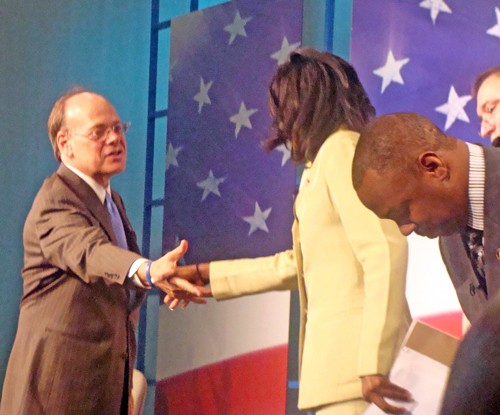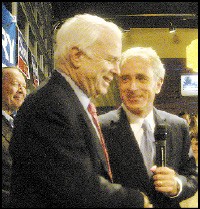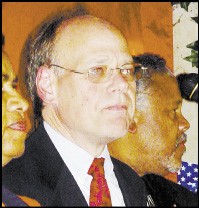Every old saw has an ideal application, and Sunday night’s
televised debate involving three 9th District congressional
candidates perfectly invoked that sardonic chestnut which goes, “All have won,
and all must have prizes.”
When the sometimes stormy hour-long affair at the studios
of WREG-TV, News Channel 3, had run its course, backers of incumbent first-term
Democrat Steve Cohen ended up being reassured of his unmatchable experience and
prowess. Those supporting Cohen’s chief primary challenger, attorney Nikki
Tinker, were likewise convinced of their candidate’s common touch and oneness
with the people. And state representative Joe Towns’ claque (such as there was
before Sunday night) were pleased with their man’s singular common sense and
panache, as well as his full-out assault on unidentified “special interests.”
Conversely, detractors of Cohen may have seen him as
somewhat smug and supercilious, Tinker’s opponents might feel justified in
seeing her as shallow and opportunistic, and those prepared to discount Towns
could have likened him – as did Richard Thompson of the Mediaverse blog –
to another notorious spare political wheel, John Willingham.
The actual impact on whatever portion of the electorate ended up watching the
debate was probably a composite of all these points of view. And, while Cohen
might have finished ahead in strict forensic terms, the equalizing effect of the
joint appearance and the free-media aspect of the forum had to be a boost for
both his rivals.
Questioning the contenders were Norm Brewer, Otis Sanford, and Linda Moore – the
former a regular commentator for the station and the latter two the managing
editor and a staff writer, respectively, for The Commercial Appeal,
a debate co-sponsor, along with the Urban League and the activist group Mpact Memphis.
All three panelists posed reasonable and relevant questions, as did the two
audience members who were permitted to interrogate the candidates – though the
issues raised (or the answers given), tended to be of the general,
all-along-the-waterfront variety. All three candidates viewed rising gas prices
and the home-mortgage crisis with alarm, and all wanted to see improved economic
horizons. Each claimed to have a better slant on these matters than the other
two, but Cohen could – and did – note early on that neither Tinker nor Towns had
found fault with his congressional record to date. “I appreciate the endorsement
of Miss Tinker and Representative Towns for my votes,” he said laconically.
The Race Issue
The first real friction as such was generated by a question from the CA‘s
Moore, who made bold to touch upon what she called “the elephant in the room” –
namely, the importance of racial and religious factors in the race.
This brought an unexpected protestation from Tinker that she was “not
anti-Semitic” and regarded it as “an insult to me” that she had been so accused.
That such an allegation had been made was news to most of those attending,
though one of her chief backers, Shelby County Commissioner Sidney Chism, had
made the point last week, addressing a black ministers’ association on her
behalf, that Jews were likely to vote for co-religionist Cohen.
And well they might, on the general principle that voters tend to gravitate
toward candidates of like backgrounds. There has been no suggestion from the
Jewish community, however, that a Jew should represent the 9th
District, while Tinker and many of her supporters openly assert that the
majority-black urban district should be represented by a black congressman. As
Tinker put it Sunday night, noting the demographic facts of life in Tennessee’s
nine congressional districts, “This is the only one where African Americans can
stand up and run,” she said. “Can we just have one?”
If Tinker expected agreement from Towns, himself an African American, she didn’t
get it. “If you’re black and no good, you’re no good. If you’re white and no
good, you’re no good,” he said, in pithy dismissal of the issue. That did not
stay him, later on, from chastising Cohen for what Towns said was the then state
senator’s anguished reaction to a lower-than-hoped-for black vote in 1996 after
losing his first congressional race to Harold Ford Jr. that year.
Cohen’s response to that was that his frustration had mainly stemmed from the
vote garnered against him that year by the late Tommie Edwards, a relatively
uncredentialed opponent in Cohen’s simultaneous reelection race for the state
senate. The congressman noted that he went on to win the black vote in the 2006
general election. As for 2008, Cohen, a sometime speaking surrogate for
presidential candidate Barack Obama this year, cited voter acceptance of racial
differences in his own case, that of Obama, and that of Shelby County Mayor A C
Wharton, an African American.
“We’ve turned a corner,” Cohen maintained. “Barack Obama, A C Wharton, and Steve
Cohen are in the same boat, and it’s a boat that’s moving forward.”
Towns made an effort to rock Tinker’s boat as well as Cohen’s, castigating as
“demeaning” her frequent declarations, in a TV commercial recycled from her
previous run in 2006 and elsewhere, that she’s running in part to make sure
that her infirm grandmother’s government check continues to get to her “porch.”
More friction
Tinker’s pitch Sunday night was heavy in such personally tinged declarations,
which constituted a counterpoint of sorts to Cohen’s frequent citation of his
endorsements and the financial benefits to the district and other
accomplishments from his legislative record, both in Congress and previously,
during his several decades as state senator. In a sideswipe clearly directed at
the incumbent, she said, “”People are tired and fed up. At the same time we’ve
got elected officials just running around here and going to galas and, you know,
giving out proclamations and renaming buildings.”
Debate moderators Richard Ransom and Claudia Barr had their hands full keeping
accurate tabs on time allotted to the principals, especially during a segment
allowing candidates to accuse and challenge each other. Tinker availed herself
of such a moment to ask Cohen, who holds an investment portfolio, if it was true
that he “profited” from an increase in gasoline prices.
The congressman rebutted the notion, contending, “I always vote against my own personal financial
interests.” He then turned the question around on Tinker, inquiring about the
stock holdings in her pension or 401 K accounts at Pinnacle Airlines, where she
works as a lawyer. Cohen also pressed Tinker on her self-definition as a “civil
rights attorney,” extracting her grudging concession that she had served
Pinnacle for the last decade on the management side of labor-relations issues.
But Cohen’s relentless prosecution of that line of questioning also yielded
Tinker what may have been an effective moment in self defense.
When the congressman interrupted Tinker at one point, insisting on a direct
answer to a question, she responded, “Mr. Cohen, I’ve respected you, and I’ve
allowed you to [finish your answers]…I’m asking for your respect, as humbly as I
know how.” Apropos his allegations about the nature of her employment, she
contended that her airline’s flight attendants and baggage handlers are “on the
front lines with me and supporting me in this campaign.” She concluded, “My
heart is pure, and I’m satisfied with what I’ve done.”
“…Who is who and what is not….”
It remains to be seen to what degree viewers were satisfied with what the
candidates, together or singly, had done in a debate that, as Towns suggested,
was meant to “allow… us to see who is who and what is not.”
One issue that remained unexamined was that of abortion, on which Cohen has long
been known as pro-choice, while Towns has just as resolutely proclaimed his
pro-life views. Tinker’s position has been shrouded in mystery, though she
received an endorsement — and presumably the promise of funding – from the
pro-choice group Emily’s List.
CA columnist Wendi Thomas, originally scheduled to be a panelist for the
debate, wrote a column speculating on the dilemma of Tinker, many of whose
supporters are virulently anti-abortion. One result of that was apparently a
negative reaction from the Tinker camp, who in any case saw her column as
over-critical and, according to debate organizers, requested that Thomas be
replaced as a panelist.
One result: Moore was there in Thomas’ stead. Another result, inadvertently or
not: No question about abortion was ever asked.
 jb
jb
Settling in for the fray: Cohen, Tinker, and Towns
 Jackson Baker
Jackson Baker  Chris Davis
Chris Davis